 |
| Geena Davis |
Geena Davis: ‘Thelma & Louise changed everything for me’
It was the moment she realised how few inspiring women there are on screen. Now the actor is on a mission to fix thatDecca Aitkenhead
Saturday 25 March 2017
Somewhere in a parallel universe, Geena Davis is having the time of her life. “Yes! Enjoying this new era in American history!” As one of the few women to have played a US president on screen, in her parallel universe Davis is having a lovely conversation with me about how fabulous it feels to see a woman finally make it to the White House.
 This isn’t the first time the actor has found her presidential fantasies preferable to reality. Eleven years ago, she was President Mackenzie Allen on the TV show Commander In Chief. “It had been the number one new show, and it was going to run for eight years. I was going to do two terms,” Davis grins ruefully. She won a Golden Globe for the role. Then internal studio politics intervened and the show was cancelled after a single season. “For a long time after, I felt like, in an alternate universe, I was still on that show. In my mind,” she says, laughing, “I wanted to set up the Oval Office in my garage and pretend I was still the president.”
This isn’t the first time the actor has found her presidential fantasies preferable to reality. Eleven years ago, she was President Mackenzie Allen on the TV show Commander In Chief. “It had been the number one new show, and it was going to run for eight years. I was going to do two terms,” Davis grins ruefully. She won a Golden Globe for the role. Then internal studio politics intervened and the show was cancelled after a single season. “For a long time after, I felt like, in an alternate universe, I was still on that show. In my mind,” she says, laughing, “I wanted to set up the Oval Office in my garage and pretend I was still the president.”
Davis hoots at her own absurdity, but for the record she did receive a fairly presidential greeting on arrival at the restaurant where we meet. The Polo Lounge at the Beverly Hills hotel is a fantastically kitsch extravaganza of salmon-pink table linen and bad taste, but a Hollywood institution nonetheless. While I waited, the lunch tables filled with industry types, and my requests for a quieter corner were defeated by the expert indifference of waiters who understand the rules of Hollywood hierarchy better than I do. But the instant Davis arrived, the maître d’ descended into an obsequious froth – “Miss Davis! Welcome back!” – and whisked us off to a coveted booth.
“So good to see you again!” he purrs, before blanching in horror. Davis has a white napkin on her lap, but her trousers are black. Quelle horreur! The offending item is whipped away and replaced with a black one, while Davis tries not to giggle.
Davis has no publicist in tow, and nothing about her outfit would suggest celebrity: she is wearing a loose white T-shirt and the sort of plain and comfortable black jacket and trousers one might put on for Sunday lunch in a nice pub. Were she not so tall (6ft), I might easily have missed her when she arrived, full of apologies for being all of 10 minutes late. I take the maître d’s instantaneous excitement to mean she must be a regular, but as soon as he’s gone, she whispers, “No! I can’t even remember the last time I was here. It’s this very weird phenomenon. If I go to hotels, they always say, ‘Welcome back’, even when I’ve never been there before.” That must be rather disorienting. “Yes, weird!” She nods cheerfully. “You have all these people saying nice things to you, and it can really be like, ‘Wow, I’m very fortunate, aren’t I?’ I’m very, very grateful for it, you know?”
When lunch arrives, she gets the giggles again: her salad is a strangely regimented platter that looks like someone’s idea of gastro-sophistication circa 1974. “It’s so kitschy! I was going to show your tape recorder my salad, but that won’t work, will it?” When her phone rings, the mother of three murmurs the universal prayer of working parents everywhere: “Please don’t be the nanny, please don’t be the nanny, please don’t be the nanny.” It feels like lunching with a gloriously irreverent and relaxed old friend.
Davis has been a Hollywood star for 35 years, but at 61 her status now is a curious hybrid of insider and outsider, a bit like cinema’s Ofsted inspector. When starting out, she’d have been astonished to know she’d devote the later years of her career to exposing her industry’s flaws. Back then, she admits, she couldn’t see anything to worry about.
“When I was first starting out was also when I first started really paying attention to the Oscars and stuff like that. And I remember thinking, wow, everything is great for women in Hollywood, because Meryl Streep, Glenn Close, Jessica Lange, Sally Field: they’re all doing incredible work. Every year, fantastic movies were coming out: The French Lieutenant’s Woman, The Postman Always Rings Twice, Sophie’s Choice. I think I did hear that, for women, when you get older it can be a problem, but these actors were already in their 30s, which seemed ancient to me then. So I thought, what’s the problem? I started getting really cool parts left and right and centre, and I was like, well, even if it turns out there’s a problem, it’s not going to impact on me.”
After making her debut in 1982’s classic comedy Tootsie, Davis averaged a movie a year, and could easily have made more had she not been “fussy”. She did sci-fi horror in The Fly, comic fantasy in Beetlejuice and literary drama in The Accidental Tourist, for which she won a best supporting actress Oscar. She played a baseball star in the sports comedy A League Of Their Own, a bank robber in the crime drama Quick Change and, most memorably, a housewife turned outlaw in the feminist road trip Thelma & Louise. Then she turned 40 and in the entire decade that followed, we saw her face only in Stuart Little.
By the time she turned 50, she was fed up. The neglect of women in film and TV was definitely happening – she knew that – but to prove it the Mensa member realised she would have to measure it: “Because people just make assumptions, don’t they? Even when the reality might be completely different. I remember talking to a woman editor of a magazine about all this a while ago, and she said, ‘Oh no, no, no, that’s just not a problem any more.’ I told her it still was. She said,” and Davis begins to laugh again, “‘But it can’t be. Look at Meryl Streep, she works all the time!’ I was like, ‘Er, Meryl’s schedule is the exception.’”
So, 10 years ago, the actor founded the Geena Davis Institute On Gender In Media. “I am completely obsessed with numbers and data. I have become a scientist in later life.” The institute conducts exhaustive research to establish the facts of gender representation in family entertainment, and they are grimly arresting.
Male characters outnumber female in family films by a ratio of three to one, a figure that has remained startlingly consistent since 1946. From 2007 to 2014, women made up less than a third of speaking or named characters in the 100 top-grossing films distributed in the US, of which less than 7% were directed by women. Of the female characters that did make it on to screen, fewer than one in five were aged 40-64. Last autumn, the institute partnered with Google to launch the Geena Davis Inclusion Quotient (the GD-IQ), a software program that measures the amount of screen and speaking time given to male and female characters. The results were even more confronting: in the top 200 grossing films of 2014 and 2015, males, Davis discovered, enjoyed literally twice the screen time of females, and spoke twice as often.
It’s easy to see why this would matter to Davis, or any other female actor, but why should the rest of us care? “This gender bias is so ingrained in us, and stuffed into our DNA from when we’re little, from our first exposure to popular culture. If kids’ movies and TV shows have profoundly fewer female characters than male characters, and there’s nobody saying, ‘By the way, honey, this isn’t real. That’s not how the real world is.’” From 2006 to 2009, not one female character was depicted in a G-rated family film working in the field of medical science, as a business leader, in law or in politics. “Our motto is: if they can see it, they can be it. Completely unconsciously, boys and girls are getting the message that girls are less important and less valuable to our society, because they’re not there. And if they are there, they’re not talking.”
Another way of looking at it, I suggest, would be that what we see on screen is, in fact, uncannily accurate. In a typical crowd scene, female extras account for just 17% of the faces we see – a figure close to this crops up across all sorts of sectors in real life in America. Fortune 500 boards are around 20% female, as is Congress. Fewer then 20% of US legal partners, the military and cardiac surgeons are female.
“Yes,” Davis agrees, “but I think the impact of media images is so profound that we actually could make life imitate art. You know, you see a dog or something and you say, ‘Oh, he’s cute’? The default is always male, and it’s because we’ve had such a male-centred culture. And it’s because it’s what we see and hear from the very beginning.
“I remember I was once with my boys [she has 12-year-old twins, and a 14-year-old daughter] in a park and they saw a squirrel. I consciously decided to say, ‘Look, she’s so cute’ and they both turned to me with surprised expressions and said, ‘How do you know it’s a girl?’ I was like, wow, I’ve already failed. They were four years old.”
Davis takes all the data to Hollywood’s “decision-makers and creators”: heads of studios, production companies, guilds. Does she come in for a bit of oh-no-here-comes-the-feminist eye-rolling? “Oh no. No! If I was going in just saying, ‘You’re making fewer movies starring a female character than male characters’, they’d say, ‘Yes, we know that. We’re fully aware of that. We hope we can do better. We wish we could do better.’ And they would probably turn to this myth in Hollywood that women will watch men, but men don’t want to watch women, so we’re forced to make all the stories about men.”
Instead, Davis shows them the GD-IQ’s findings on profitability. Films featuring female leads make on average 15% more than those with male leads, while films featuring male and female co-leads earn almost 24% more than those with either a solo male or female lead. “Their jaws are on the ground.” She grins. “Everywhere we go, it’s the exact same reaction. They are floored.”
***
Had anyone told Davis in her youth that she would one day be an activist and advocate, she would have been equally floored. She grew up in a small town in Massachusetts, a bookish child and church organist, and “was constantly shy. Just totally shy, especially about men. I had one date in high school, that was it, and he didn’t ask me out again,” she laughs, “because I was taller than everybody. I was very gangly and awkward, and I wore weird clothes that I made. I think my fondest wish as a kid was to take up less space.”
‘My fondest wish as a kid was to take up less space.’ Photograph: Amanda Friedman for the Guardian
Most people’s childhood self-image can seem surprising by the time they’re in their 60s, but in Davis’s case the discrepancy feels comical. She is 6ft and appropriately proportioned, so occupies as much space as you would expect someone with the dimensions of an imposing man to fill. Her voice is gutsy, soaring from throaty depths to gales of laughter, and her beauty is unlike anything I’ve observed in an actor. Beautiful women who have lived their life in the public gaze tend to convey an awareness of others’ admiration that can sometimes seem self-conscious, and sometimes almost pointedly detached. Davis, on the other hand, reminds me more of my cat, a ludicrously gorgeous creature who seems to take as much pleasure from its beauty as any admirer ever could. If I picture Davis looking at herself in the mirror, she isn’t frowning anxiously but smiling back at her famous dimples.
And yet she goes on, “I think I really wanted to take up less space. It seemed like every time I was exuberant or free, I would get pointed at. Things that really stand out from my childhood were incidents where people told me to tone it down. Like my beloved aunt Gloria, who was a role model and just everything to me, and who adored me, and would say things like, ‘You’re really going to have to learn to laugh more quietly, because boys aren’t going to like a loud lady.’”
She knew from the age of three that she wanted to act, and studied drama at Boston University. “But the most important thing was that people like me and think I’m no trouble. It was as if I lived in some bubble of extreme femininity where you must never say your feelings. I had people who wouldn’t date me because I couldn’t even decide what restaurant I wanted to go to, literally. I never said my opinion about anything. I was afraid to.”
Everything changed in 1990 when she made Thelma & Louise. Davis played Thelma, an unhappy wife who takes off with her friend Louise, played by Susan Sarandon, for a two-day road trip in an old Thunderbird convertible. When a man they meet in a bar tries to rape Thelma, Louise shoots him dead. Convinced the police will never believe their account of events, because Thelma had been drinking and seen dancing with the man before he attacked her, the pair take off. Liberated from the constraints of social convention and the law, they embark on a raucously anarchic adventure from which they will never return.
With then husband Jeff Goldblum in 1989.
Davis had her agent call Ridley Scott, the film’s director, every single week for a year in a concerted campaign to land the part. “So it was really, really a passion project for me. And I was aware of women’s position in Hollywood by then. But then, when the movie came out and I saw the reaction women had, it was night and day: completely different from anything that had ever happened before, you know? Women wanted to really talk about how it impacted on them. They’d tell me, ‘This is what I thought, this is who I saw it with, this is how many times I’ve seen it, this is how it really changed my marriage.’ Sometimes I’d even hear, ‘My friend and I took a road trip and acted out your trip.’” Her eyes widen as she laughs. “I’m like, ‘I hope the good parts?’ But that really struck me, and it made me realise how few opportunities there are to feel inspired by the female characters we watch. That changed everything for me.”
Working with Sarandon changed everything, too. “Every day on set, I was just learning how to be more myself, you know? Just because she was such a role model to me.” Davis would arrive each morning with her notes tentatively framed in the apologetic, would-you-mind-awfully register of regulation feminine decorum. Sarandon would bustle in, open her mouth and speak her mind. Davis still beams at the memory, and credits it with revolutionising the way she operated.
Her institute is now in its 10th year, but has yet to generate any measurable change in onscreen representation. “I feel very confident that’s going to happen in the next five to 10 years, though. I know it will. There’s one children’s network that tells us, every time someone pitches a new idea, someone asks, ‘What would Geena say?’” She roars with laughter. “Which is exactly what I want!” The parallel between her work and recent increasingly successful campaigns for greater ethnic onscreen diversity in Hollywoodspeak for themselves, she says. “It’s exactly the same problem, with exactly the same solution. When a sector of society is left out of the popular culture, it’s cultural annihilation.”
Davis does still act; in recent years, she starred in the TV shows Grey’s Anatomy and The Exorcist, and appears in the forthcoming sci-fi thriller Marjorie Prime. She’s also in Don’t Talk To Irene, an indie film about an overweight cheerleader, which premiered recently in Canada. But it’s very clear that acting is no longer her driving ambition. She gets much more excited talking about the film festival she co-founded in 2015, the only one in the world to offer its winners the prize of guaranteed distribution, both theatrical and through DVD. The Bentonville festival explicitly exists to champion and promote female and other minority film-makers, and last year became the eighth biggest film festival in the world; this year, it will open in early May in Arkansas and more than 100,000 people are expected to attend.
The most conventionally starlet thing about Davis these days is probably her marital history: she is now on her fourth marriage. The first, in 1982, lasted less than a year; her second, to the actor and her sometime co-star Jeff Goldblum in 1987, lasted only slightly longer, and was over by 1990. In 1993, she wed the director Renny Harlin, but divorced again in 1998. She has been married to her fourth husband, Reza Jarrahy, the father of her three children, and an Iranian-American plastic surgeon, for 16 years now. Giving birth for the first time at 46, followed by twins at 48, is not an entirely advisable maternal strategy, she laughs. “I don’t know how I assumed I could wait that long, and I wouldn’t recommend it. I’d always known I wanted to have kids, but somehow, before then, there wasn’t any time I was planning it.”
When we part, she gives me a great bear hug and her phone number, and it strikes me that she must be one of the happiest movie stars I can remember meeting. The parallel universe she inhabits appears to have much to recommend it. I had assumed she would put Hillary Clinton’s defeat down to her motto – “If she can see it, she can be it” – so ask if she thinks America would have voted a different way last September had the notion of a woman in charge of the country looked more familiar.
“You know,” she surprises me, “I don’t know. I like to just think that she won the popular vote by an enormous amount. She was not this horrifically flawed candidate everyone wants to paint. I mean, OK, she didn’t win the electoral college vote. But, in another way, she did win.” In Davis’s parallel universe, the popular vote determined who would move into the White House, and all is well with the world.

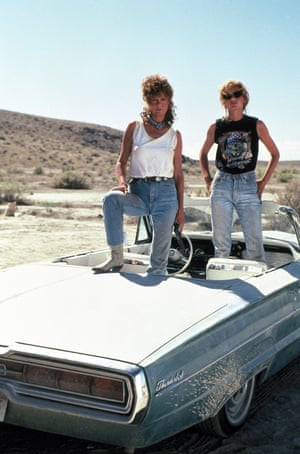
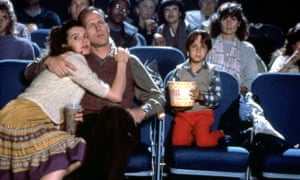
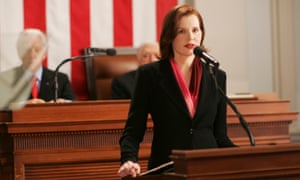
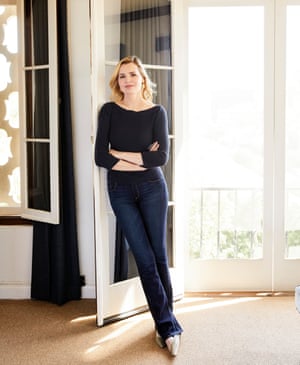
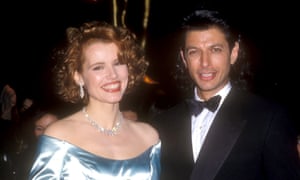
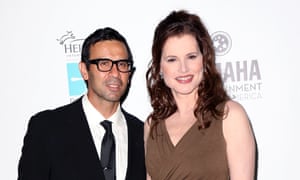

No comments:
Post a Comment